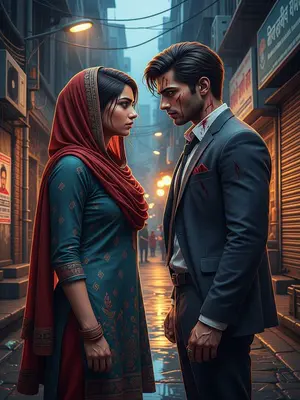Chapter 2: The Girl Left Behind
Studying was always easy for me. Ever since I was a child, if I wanted to be first in my grade, I was.
The faint rustle of notebook pages and the musty scent of old textbooks were my comfort. I never needed tuition or extra classes—just a strong cup of chai and my favourite blue pen. Teachers always used to tell the others in class, “See Meera? She’s the example. Do your work like her, beta.”
I’d inherited my mother’s looks too.
People would say, “Wah, Meera, you’ve got your mother’s big eyes and that sharp nose.” Even the aunty in our building would comment when she saw me heading to the market, “Arrey, badi sundar hai tu. Bilkul apni maa pe gayi.”
Except for coming from a middle-class family, I had almost no flaws.
We lived in a modest two-room flat, the sort where you could hear the neighbours’ TV dramas through the wall. No marble flooring, no fancy curtains—just old wooden almirahs, and a fridge that rattled every time the compressor kicked in. I never really minded. I learned to keep my shoes polished and my uniform spotless, because that’s how you survived among the city’s rich kids.
In middle school, my mother married a wealthy businessman and left me a bank card.
"Don’t contact me again. I’ll send you money every year."
She told everyone she was single and didn’t want my existence to affect her remarriage.
I remembered the night she left—no drama, no hugging. She simply packed her bags, handed me the bank card, and told me not to call her. The leftover chai cup on the table still had a fresh lipstick mark, the steam curling upward as if waiting for her return. The next morning, the smell of her perfume had vanished from the flat, as if she’d never been there at all. Our neighbours gossiped in hushed tones on the stairwell, “Meera’s mother has left. No shame these days, I tell you. Poor girl.”
I didn’t feel anything. I accepted her card and told everyone I was an orphan.
After that, I stopped waiting for anyone to come home. I ate alone, studied alone, watched old Hindi movies on the weekend, and never let myself cry in front of anyone. At school, I shrugged off questions, pretending my parents had died in some accident. People felt sorry for me and left me alone—exactly how I wanted it.
I was born emotionally indifferent; my mother never liked me.
My mother had always been distant, preferring to scroll through Instagram or go to kitty parties instead of spending time with me. She’d snap if I called her ‘Maa’ in public, as if the word itself was dirty. Over the years, I’d learned to pack my own tiffin and iron my own uniforms, never expecting a gentle hand to smooth my hair or a warm voice to wake me up.
She preferred a daughter who could sweetly call her "Maa," even if it was her stepdaughter.
She wanted a girl who would show off her new dresses and give her big hugs for every little thing—a girl who’d say “Maa, you’re the best!” in front of guests. Even if it was for show, she wanted that softness.
Soon her Instagram was full of photos of another girl—the daughter left behind by the rich businessman’s ex-wife.
Her name was Priya Sharma, bright and beautiful.
My mother half-embraced her, while Priya pouted, her fake smile full of resentment.
The caption would read, “My sunshine, my blessing,” and aunties would leave hearts and “Mashallah, what a pretty girl!” in the comments. Priya’s resentment, though, peeked out from the corners of her perfect smile—a smile trained for cameras, but never reaching her eyes.
For the first time, someone else’s smile stung me.
I’d never wanted anything from my mother. But seeing her with Priya—a daughter she could parade around, a family she chose—made something sharp twist in my chest. Not jealousy, exactly, but the dull ache of being left behind. Maybe I was human after all.
Life was bland and dull.
My only pleasure was seeking out people who could stir my emotions.
So, I moved and bought a sixty-square-metre 2BHK flat in the school district, transferring to the high school Priya attended.
I told myself I wanted a fresh start, but really, it was the hope of feeling something—anything—that made me leave the old flat behind. The new place was small, with peeling paint and a leaky tap, but it was mine. I stared out the window at the chaos below, the honking rickshaws and street vendors selling vada pav, wondering what would come next.













